|
Stage Six: Outer Orbits |
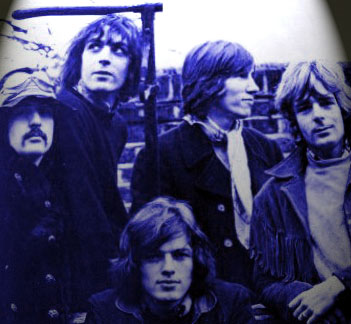
A rare photo of all five Pink Floyd members, January 1968 |
|
Syd Barrett: I don't know that there was really much conflict, except that perhaps the way we started to play wasn't as impressive as it was, wasn't as full of impact as it might've been. I mean, it was done very well, rather than considerably exciting. Roger Waters: When he was still in the band in the later stages, we got to the point where anyone of us was likely to tear his throat out at any minute because he was so impossible... Dave Gilmour: I loved the first album, but I thought the gigs were pretty interminable. It was too anarchic. I was all for musicking things up a bit. I definitely considered myself a superior musician and I remember thinkng that I could knock them into some sort of shape. Rick Wright: Peter Jenner and Andrew King (the Floyd's managers) thought Syd and I were the musical brains of the group, and that we should form a breakaway band, to try and hold Syd together. He and I were living together in a flat in Richmond at the time. And believe me, I would have left with him like a shot if I had thought Syd could do it. Syd Barrett: (when asked if he was difficult to work with) No. Probably my own impatience is the only thing, because it has to be very easy. But there's a lot more to playing than travelling around universities and things. Bryan Morrison: He didn't leave of his own free will, really. I mean, he kept threatening to leave. I think in the end it was by mutual agreement, because he was having some personal problems. He wasn't able to get it together anymore, and by agreement he left the band. Jerry Shirley: They were pulling their hair out, they decided to bring in another guitarist to complement, so Syd wouldn't have to play guitar and maybe he'd just do the singing. Dave came in and they were a five-piece for about four or five weeks. It got better because Dave was together in what he did. Then the ultimate decision came down that if they were going to survive as a band, Syd would have to go. Now I don't know whether Syd felt it and left, or whether he was asked to. But he left. Dave went through some real heavy stuff for the first few months. Syd would turn up at London gigs and stand in front of the stage looking up at Dave; 'That's *my* band.' Roger Waters: I had no idea that I would ever really write songs, and in the early years, I didn't have to because Syd was writing all the material and it was only after he stopped writing that the rest of us had to start trying to do it. I'd always been told, at school anyway, that I was absolutely bloody hopeless at everything, so I had no real confidence about any of it. Peter Jenner: (on the trademark Dave Gilmour slide and echo guitar style) That's Syd! Onstage Syd used to play with slide and a bunch on echo-boxes. At the time David Gilmour was doing very effective take-offs of Hendrix-style guitar-playing. So the band said 'play like Syd Barrett'. Syd Barrett: It wasn't really a war. I suppose it was really just a matter of being a little offhand about things. We didn't feel there was one thing which was gonna make the decision at the minute. I mean, we did split up, and there was a lot of trouble. I don't think The Pink Floyd had any trouble, but I had an awful scene, probably self-inflicted, having a mini and going all over England and things. Still... David Gilmour: Yeah, it was fairly obvious that I was brought in to take over from him, at least on stage ... It was impossible to gauge his feelings about it. I don't think Syd has opinions as such. The first plan was that I would join and make it a five piece so it would make it easier so that Syd could still be strange but the band would still function. And then the next idea was that Syd would stay home and do writing and be the Brian Wilson elusive character that didn't actually perform with us and the third plan was the he wouldn't do nothing at all. And it quickly changed 'round, and it was just....it was *obviously* impossible to carry on working that way so we basically ditched Syd, stopped picking him up for gigs. David Gilmour: Syd's on three or four tracks on 'A Saucerful of Secrets', including 'Remember A Day' and 'Jugband Blues'. He's also on a tiny bit of 'Set The Controls For The Heart Of The Sun.' (Editor's note: according to various sources, Syd may have also played on 'Corporal Clegg' and 'See Saw') John Marsh: He went in a fairly bloody coup. Personality problems and differences within the band virtually meant that Syd was elbowed out. It was all very tragic: one week he was playing anf the next it's David Gilmour. Syd started off on a long downward slide. Peter Jenner: We tried to stop him going crazy. I put all my textbook sociology, all the stuff I'd read about psychology in action; we took him to R.D. Laing. Laing didn't say much. We tried to take what he said literally, we tried to use the inner meaning of what he was saying, we tried to change the objective situations. We moved him out of Cromwell Road but by the time he was with Storm and Po it was too late. David Gilmour: He functions on a totally different
plain of logic, and some people will claim, 'Well yeah man he's on a higher
cosmic level' - but basically there's something drastically wrong. It wasn't
just the drugs - we'd both done acid before the whole Floyd thing - it's
just a mental foible which grew out of all proportion. I remember all sorts
of strange things happening - at one point he was wearing lipstick, dressing
in high heels, and believing he had homosexual tendencies. We all felt
he should have gone to see a psychiatrist, though someone in fact played
an interview he did to R.D. Laing, and Laing claimed he was incurable.
What can you do, you know?
|
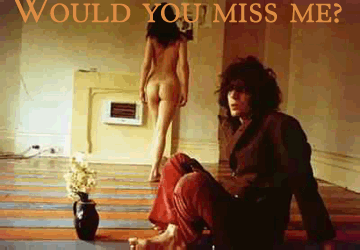 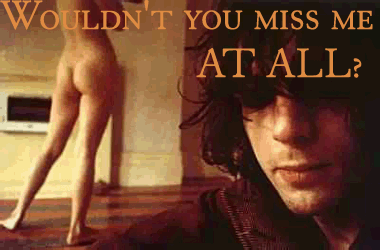
Syd Barrett and Iggy the Eskimo at his Earl's Court Square flat, 1969
|
| Duggie Fields: Even when he was out of the group
people kept coming around and he would actually lock himself in his room.
Like if he made the mistake of answering the front door before he'd locked
himself in his room, he found it very difficult to say no. He'd have these
girls pounding on his bedroom door all night, literally, and he'd be locked
inside, trapped. He did rather encourage that behavior to a certain extent,
but then he didn't know what to do with it; he would resent it.
Duggie Fields: When he gave up the group he took up painting again for a bit, but he never enjoyed it. He didn't really have a sense of direction. He used to lie in bed every morning, and I would get this feeling like the wall between our rooms didn't quite exist, because I'd know that Syd was lying in bed thinking, 'What do I do today ? Shall I get out of bed ? If I get out of bed, I can do this, and I can do that - or I can do *that*, or I could do that.' He had the world at his feet, all the possibilities, and he just couldn't choose. He had great problems committing himself to any action. As for committing himself to doing anything for any length of time - he was the kind of person who'd change in the middle. He'd set off, lose his motivation, and start questioning what he was doing - which might just be walking down the street. Duggie Fields: Sometimes he'd be completely jolly and then just snap - you could never tell what he was like. He could be fabulous. He was the sort of person who had amazing charm; if he wanted your attention, he'd get it. He was very bright. After he left the group he was very much aware of being a failure. I think that was quite difficult, coming to terms with that. Duggie Fields: (Syd, unable to tolerate the parasites and hangers-on any longer, went back to Cambridge) He just left them, and then rang me up and said that I had to get rid of them. I said *he* had to get rid of them, bit I actually did in the end. I said, 'Look, Syd wants you out; he's coming back!' They were a bit frightened of him because he did have a violent side. Peter Jenner: I think Syd was in good shape when he made 'The Madcap Laughs'. He was still writing good songs, probably in the same state as he was during 'Jugband Blues'. Duggie Fields: He really didn't have to have that much control before, but when you have to provide you own motivation all the time it is difficult, certainly in terms of writing a song. When it came down to recording there were always problems. He was not at his most together recording 'The Madcao Laughs'. He had to be taken there sometimes, and he had to be got. It didn't seem to make any difference whether it was making him happy or unhappy; he'd been through that, the excitement of it, the first time around. Storm Thorgerson: The thing was that all those guys had to cope with Syd out of his head on Mandrax half the time. He got so 'mandied' up on those sessions, his hand would slip through the strings and he'd fall off the stool. Gilmour: We had basically three alternatives at that point, working with Syd. One, we could actually work with him in the studio, playing along as he put down his tracks - which was almost impossible, though we succeeded on 'Gigolo Aunt'. The second was laying down some kind of track before and then having him play over it. The third was him putting his basic ideas down with just guitar and vocals and then we'd try and make something out of it all. It was mostly a case of me saying 'Well what have you got then Syd?' and he'd search around and eventually work something out. Jerry Shirley: (After failing to get a lead guitar track for 'Dominoes', Gilmour had Syd play guitar to tracks played backwards) It played back, and the backwards guitar sounded great; the best lead he ever played. The first time out and he didn't put a note wrong. Gilmour: (On 'Dominoes') The song just ended after
Syd had finished singing and I wanted a gradual fade so I added that section
myself. I played drums on that, by the way, and the final re-mix on 'The
Madcap Laughs' was all mine as well.
|
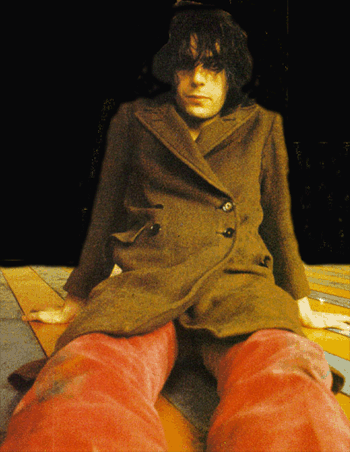 Octopus Octopus
Syd Barrett: 'Octopus' I carried that about in my head for about six months before I actually wrote it, so maybe that's why it came out so well. The idea was like those number songs like 'Green Grow the Rushes Ho' where you have, say, twelve lines each related to the next and an overall theme. It's like a fool-proof combination of lyrics, really, and then the chorus comes in and changes the tempo but holds the whole thing together. so trip to heave and ho, up down, to and fro'
|
| Jerry Shirley: 'If It's In You' (where Syd breaks
off halfway through) is a classic example of Syd in the studio. Between
that and talking in very obscure abstracts. It's all going on in his head,
but only little bits of it manage to get out of his mouth. And then the
way he sings he goes into that scream - sometimes he can sing a melody
absolutely fine, and the next time 'round he'll sing a totally different
melody, or just go off key. 'Rats' in particular was really odd. That was
just a very crazed jam, and Syd had this lyric that he just shouted over
the top. It's quite nuts. But some of his songs are very beautiful. You
never knew from one day to the next exactly how it would go.
Syd Barrett: (asked if he was satisfied with 'The Madcap Laughs') Yes, I liked what came out, only it was released far too long after it was done. I wanted it to be a whole thing that people would listen to all the way through with everything related and balanced, the tempos and moods offsetting each other, and I hope that's what it sounds like, I've got it at home, but I don't listen to it much now. Roger Waters: (on co-producing 'The Madcap laughs') That's it! I can't cope with that again. Twink: I didn't know him closely for that long, but I was in the same space and I could understand exactly where he was at. I thought he was very together, you know. As a friend it was a very warm relationship; no bad vibes at all. We didn't have any crazy scenes. Syd Barrett: (on playing live versus recording - 1971) I feel though the record would still be the thing to do. And touring and playing might make that impossible to do. I'm afraid I think I'd have to get on with (the musicians). They'd have to be good musicians. I think they'd be difficult to find. They'd have to be lively. Jerry Shirley: (on playing live with Syd, Extravaganza Music and Fashion Festival, June 6th, 1970) He was going to do it, he wasn't going to do it, it was on and off, so finally we said, 'Look, Syd, come on, man - you can do it!' We got up, I played drums, David Gilmour played bass and he managed to get through a few songs. It got good, and then after about the fourth song Syd said, 'Oh great; thanks very much' and walked off! We tried, you know.
|
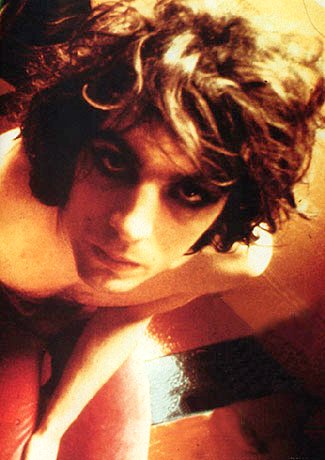 Syd,
1969, photographed by Mick Rock Syd,
1969, photographed by Mick Rock
for the legendary 'Madcap Laughs' photo session |
| Twink: (on playing live with Syd, Cambridge Corn
Exchange, Feb. 1972) We just weren't ready...it was a disastrous gig, the
reviews were really bad, and Syd was really hung up about it; so the band
folded. He came 'round to my house and said he didn't want to play anymore.
He didn't explain; he just left. I was really amazed working with him,
at his actual ability as a guitar player.
Peter Jenner: Creatively, he was as dead as Jimi Hendrix. He appeard every now and then after that. Twink, from Tomorrow, tried to get him together, I tried, Dave Gilmour did sessions with him. He'd occassionally turn up to Floyd sessions and talk about them as 'my group'. He kept thinking he was still with them. Syd does resent the Floyd. I don't know - he may *still* call them 'my band' for all I know. Either (Syd is unable to write songs) or he won't show them to anyone Syd Barrett: (asked if there would be a third solo LP) Yeah. I'm working on the album. There's four tracks in the can already, and it should be out about September. There are no set musicians, just people helping out, like on 'The Madcap Laughs', which gives me far more freedom in what I want to do...I geel as if I've got lots of things, much better things to do still, that's why there isn't really a lot to say, I just want to get it all done. I've got some songs in the studio, still. And I've got a couple of tapes. It should be 12 singles, and jolly good singles. I think I shall be able to produce this one myself. I think it was always easier to do that. There'll be all kinds of things. It just depends what I feel like doing at the time. The important thing is that it will be better than the last. Peter Barnes: (Syd's last recording dates) It was an abortion. He just kept over-dubbing guitar part on guitar part until it was just a total chaotic mess. He also wouldn't show anyone his lyrics - I fear actually because he hadn't written any. Syd Barrett: (asked by Bryan Morrison if he'd written any new songs since the final, abortive November 1974 session) No. Peter Jenner: He'd come in to Abbey Road studios and glimpses of tunes would come out, and we'd think, 'Record that!' and thn it would disappear into incoherence again. It was horribly frustrating because there were sporadic glimpses of the old Syd coming through, and then it would all get horribly distorted again. Nothing remains from the sessions. Syd Barrett: (on songwriting) I always write with guitar. I've got this big room and I just go in and do the work. I like to do the words and music simultaneously, so when I go into the studio I've got the words on one side and my music on the other. I suppose I could do with some practice. Jerry Shirley: (on possibility of Syd returning to music) The last person to make that sort of effort was Dave, and they barely got him to do it; it was like pulling teeth. Since then I don't think there's anybody close enough to him to get him to do it. He would have to return to the planet long enough for someone to believe that he's got it in him to actually get through the sessions. And that would just be the first step. The guys really did persevere through those sessions, god! Especially Dave, particularly in light of the way Syd was to him before. But if he showed that he really wanted to try for it, then maybe one of them would make the effort. Bryan Morrison: (asked if Syd would make music again) No. It's impossible.Syd Barrett: (asked if he would enjoy playing again) Yes, that would be nice. I used to enjoy it, it was a gas. But so's doing nothing. It's art school laziness, really. Duggie Fields: (on running into Barrett in London's Speakeasy club) I wasn't sure he recognized me. I was with some people he'd known for years; we talked for about five minutes, but did he really know who we were ? That was when he was starting to get heavy, and he didn't look like the same kind of person at all. |
 Duggie
Fields: (On Syd's plan to become a doctor) Yes, a doctor, and he and
(fiancee) Gayla Pinion were going to get married and live in Oxford. He
had a bit of the suburban dream. That was a very bizarre sort of thing
underlying him. He had lots of concepts that he found very attractive like
that; he didn't really like all the one-night stands; he wanted the marriage
and that bit, in the back of his head. Duggie
Fields: (On Syd's plan to become a doctor) Yes, a doctor, and he and
(fiancee) Gayla Pinion were going to get married and live in Oxford. He
had a bit of the suburban dream. That was a very bizarre sort of thing
underlying him. He had lots of concepts that he found very attractive like
that; he didn't really like all the one-night stands; he wanted the marriage
and that bit, in the back of his head.
Peter Barnes: (on interviewing Syd) It was fairly ludicrous on the surface. I mean, you just had to go along with it all. Syd would say something completely incongruous one minute like 'It's getting heavy, isn't it?' and you'd just have to say, 'Yeah, Syd, it's getting heavy,' and the conversation would dwell on *that* for five minutes. Actually, listening to the tape afterwards you could work out that there was some kind of logic there - except that Syd would suddenly be answering a question you'd asked him ten minutes ago while you were off on a different topic completely! Jerry Shirley: Sometimes he does it just to put everybody on, sometimes he does it because he's genuinely paranoid about what's happening around him. He's like the weather, he changes. For every 10 things he says that are off-the-wall and odd, he'll say one thing that's completely coherent and right on the ball. He'll seem out of touch with what's gone on just before, then he'll suddenly turn around and say, 'Jerry, remember the day we went to get a burger down at the Earl's Court Road ?' - complete recall of something that happened a long time ago. Just coming and going, all the time. Peter Jenner: (on Syd shaving his head) I'm rather tempted to view it as a symbolic gesture. You know - goodbye to being a pop-star. Peter Barnes: Syd has always had this big phobia about his age. When we would try to get him back into the studio to record he would get very defensive and say 'I'm only 24, I'm still young. I've got time.' John Marsh: I saw him years later, on South Kensington tube station. He looked like a picture of the middle-aged Aleister Crowley. Totally bald, about 15 stone, wearing a Hawaiian shirt and Bermuda shorts. Jenny Fabian: Years later I found him again living up the road from Earls Court in a flat where he had room. Again he didn't speak much. He was sitting in the corner on a matress and he'd apinted every other floorboard alternate colours, red and green. He boiled an egg in a kettle and ate it. And he listened over and over again to Beach Boys tapes, which I found distressing. He was still exactly the same, only now he was only Syd Barrett the has-been rather than Syd Barrett the star. Years after that I was told that he lived in the Penthouse Club and was very fat and got a weekly cheque from the Floyd. I prefer to remember him as this thin, white, violet-eyed nutter who didn't speak much and who wrote wonderful songs. Roger Waters: (on writing 'Shine On, You Crazy Diamond': Pink Floyd's 1975 tribute to Syd) It was very strange. The lyrics were written, and the lyrics are the bit of the song about Syd, the rest of it could be about anything, I don't why I started writing those lyrics about Syd... I think because that phrase of Dave's was an extremely mournful kind of sound and it just... I haven't a clue... but it was a long time before the 'Wish You Were Here' recording sessions when Syd's state could be seen as being symbolic of the general state of the group: very fragmented. Jerry Shirley: The last time I saw him was possibly the last time the guys in the Floyd saw him, too. They were putting the finishing touches on 'Wish You Were Here'. Earlier that day Dave Gilmour had gotten married and they had to work that night, so EMI had this roundtable dinner in the canteen for them. Across the table from me was this overweight Hare Krishna-looking chap. I thought maybe it was just someone who somebody knows. I looked at Dave and he smiled; then I realized it was Syd. The guy had to weigh close to 200 pounds and had no hair on his head. It was a bit of a shock, but after a minute I plucked up enough courage to say hello. I introduced my wife and I dunno; I think he just laughed. I asked him what he was doing lately. 'Oh, you know, not much: eating, sleeping. I get up, eat, go for a walk, sleep.'' Andrew King: (recognising Syd) 'Good God, it's Syd! How did you get like that?' Syd: 'I've got a very large fridge at home and I've been eating a lot of pork chops.' Gilmour?: (on Syd hearing 'Wish You Were Here') (Roger turned to Syd and asked) 'Well, Syd what do you think of that ?' Syd said, 'Sounds a bit old.' I believe Syd just got up and split not too long after that. After two years of nobody seeing him, of all the days for him to appear out of nowhere! Roger Waters: When he came to the 'Wish You Were Here' sessions, ironic in itself....to see this great, fat, bald, mad person, the first day he came I was in fucking tears... 'Shine On, You Crazy Diamond' was not really about Syd, he's just a symbol for all the extremes of absence some people have to indulge in because the only way they can cope with how fucking sad modern life is to withdraw completely. And I found that terribly sad... Rick Wright: I walked into the studio at Abbey Road, Roger was sitting, mixing at the desk, and I saw this big bald guy sitting on the couch behind. About 16 stone: huge, bald, fat guy. And I didn't think anything of it. In those days it was quite normal for strangers to wander into our sessions. I thought, 'He looks a bit...strange' Anyway, so I sat down with Roger at the desk and we worked for about ten minutes, and this guy kept on getting up and brushing his teeth and then sitting, doing really weird things, but keeping quiet. And I said to Roger, 'Who is he?' and Roger said 'I don't know.' and I said 'Well, I assumed he was a friend of yours,' and he said 'No, I don't know who he is.' Anyway, it took me a long time, and then suddenly I realized it was Syd, after maybe 45 minutes. He came in as we were doing the vocals for 'Shine On You Crazy Diamond,' which was basically about Syd. He just for some incredible reason picked the very day that we were doing a song which was about him. It was a huge shock, because I hadn't seen him for about six years. He kept standing up and brushing his teeth, putting his toothbrush away and sitting down. Then at one point he stood up and said, 'Right, when do I put my guitar on?' And of course he didn't have a guitar with him. And we said, 'Sorry Syd, the guitar's all done'. That's what's so incredibly...weird about this guy. And a bit disturbing, as well, particularly when you see a guy and you don't recognize him. And then for him to pick the very day we start putting vocals on a song about him. Very strange.
|